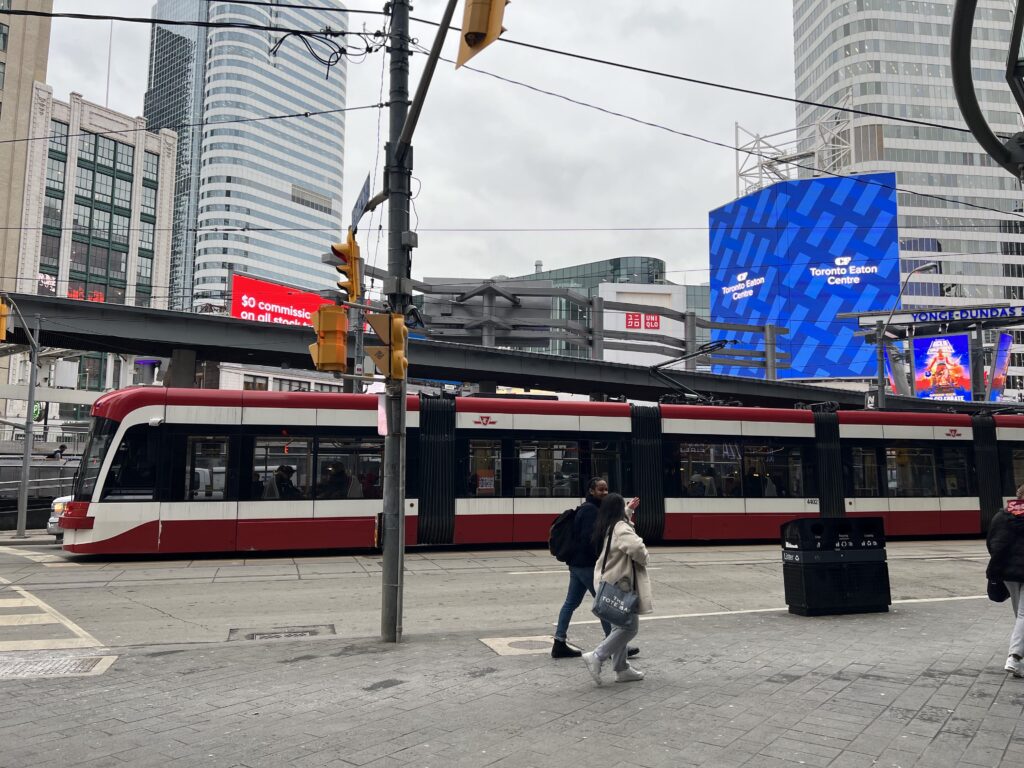
Listen to the story here:
On Jan. 18, a person wearing a religious head-covering was knocked to the ground at Bloor-Yonge subway station in what police said was an alleged hate-motivated assault. Two days later, on Jan. 20, a man was masturbating aboard a subway train near Woodbine station and allegedly sexually assaulted a woman on the train. That same day, a suspect was arrested after attempting to push someone onto the train tracks at Bloor-Yonge station.
Three days after that — on Monday afternoon — four teenage boys were arrested after uniformed Toronto Transit Commission (TTC) employees were attacked in a swarm. They’ve since been arrested.
On Tuesday, a suspect was arrested after a woman in her 20s was stabbed on the TTC Spadina streetcar. Then, this morning, two TTC employees were chased through Dundas station by a person holding a syringe. Police say a suspect was arrested on scene.
That’s just one week’s worth of unrelated, violent attacks.
The TTC reported 735 offences against customers in 2020 and 734 in 2021, according to data obtained by the Toronto Star. The newspaper estimated that with 2022 offences already above 450 by the halfway mark of 2022 that the year’s total would be several hundred higher than years past. On The Record reached out to the TTC for comment, but did not get a response in time for publication.
The crime spree has some people questioning how safe the TTC really is.
Shannon Marks, a third-year biology student, said she often takes the subway a few times a week, but has recently been trying to take GO Transit instead. She doesn’t feel safe on the subway — nor does she believe the TTC has done anything to make its riders feel safe.
“There is a lack of security, more than anything,” said Marks.
“I try not to get on the subway as much as I can,” said Kami Lin, a first-year graphic communications management student. “I see all over the world there’s so many things that are happening with hate crimes and it does make me feel very uneasy to go on those transportations.”
The TTC phased out subway door guards in 2016 and booth collectors in 2020, which TTCriders coordinator, Shelagh Pizey-Allen, said could increase the risk of incidents because those were the closest staff available to respond in cases of emergency.
TTCriders is a group of transit users trying to create an “accessible, frequent, dignified public transit that connects all Toronto neighbourhoods.”
“These are things that could make our transit system so much more welcoming and friendly and accessible to use, but then it has that added benefit of safety that someone is around,” said Pizey-Allen.
In response to the person wearing a religious head-covering being pushed to the ground, Mayor John Tory called for Torontonians to “stand together against discrimination and violence.”
In the written statement, Tory said the city and its transit system should be a safe space for all and free of any hatred.
The TTC issued a similar statement saying that the safety of riders and employees is paramount in all it does. “This includes being safe from violence related to bigotry, racism, sexism or any other assault motivated by hate,” it said.
On Monday, ATU Local 113, which represents nearly 12,000 transit workers, released a statement saying, “Enough is enough.”
“We have reinforced our ask with Toronto’s Mayor, John Tory, and the TTC’s CEO, Rick Leary,” ATU Local 113 said. “Listen to the individuals who are your eyes and ears on the ground. It’s getting out of hand and public transit needs to be safe again for our workers and passengers.”
In the city’s proposed 2023 budget, $2.38 billion will be allocated to conventional transit, meaning streetcars, buses, trains and subways, as well as Wheel-Trans services. Of that money, the budget states that more than $4 million will go toward safety, security and cleanliness and 25 new transit special constables will be added.
Pizey-Allen said TTCriders does not believe expanding the special constables is the right approach. “They don’t tackle the root causes of this sort of insecurity we’re seeing and they also make Black and Indigenous transit users less safe,” she said.
Transit advocate Steve Munro also doesn’t believe the budget allocated to transit security will make much of a change.
“You can hire more special constables, but you need an awful lot of security people in order to have a decent presence across a system the size of the TTC,” Munro said.
He said he worries that a visible presence of security and police may do the opposite of what he believes they were meant to do, which is limit crime on the TTC.
“If someone isn’t thinking clearly for whatever reason, I’m not sure that having cops standing in the station is gonna make a difference to how they behave,” Munro said.
The budget would see the TTC cut back service and Pizey-Allen said she’s concerned that could create more incidents.
“Less service means less safety, waiting longer for your streetcar, waiting longer for your bus, waiting longer for your subway,” she said. “When they arrive, they will be more crowded and that is a safety issue.”
As TMU is a commuter school, many students rely on the TTC to get to campus. Per a 2020 report, 77 per cent of TMU students use local and regional transit as their primary means of transportation.
So while Lin worries about riding the subway, there is no other way of getting to school that is “easy on the finances.”
She said she feels the primary concern of the security measures are to ensure people pay their fares. She does not typically see security guards trying to protect passengers and it’s more often the security checking if everyone paid their fare, said Lin.
“Because I don’t really see security guards trying to protect the passengers but more like work[ing] against them in a sense,” said Lin.
Editor’s note: The original version of this story mentioned an alleged sexual assault on a bus leaving Kipling Station on Jan. 21. However, on Jan. 25, police updated their information to say that no criminal offense occurred. As a result, OTR has removed reference to this event.
Reporter, On The Record, Winter 2023

